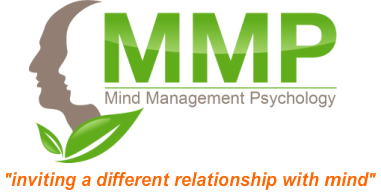
useful way to improve yourself in psychological terms is to change the relationship you have with your mind. This has direct immediate and tangible benefits, and it’s easy to do if you use your imagination. At Mind Management Psychology we say once you have done this for the first time, you need to practise this daily, or, if you forget then simply press the refresh button to re-mind yourself about your own mind.
When your mind is not behaving or, when you want things different from the way they are and you’re feeling stressed or depressed just thank your mind. Things always can be better and worse, they will always change, things can always improve. The mind has this amazing capacity for criticism and complaining, seeing negatives before positives. If you don’t believe this, just try watching it.
We said in the post MMP & Not Holding on as Tightly that the mind usually feels losses more readily than gains, sees obstacles before possibilities and bad luck before good luck. This in combination is psychological suffering at work.
The good thing about the suffering is that it can lead us to a different way of thinking about the mind. Instead of thinking about the mind as the brain or a computer that does its own thing try imagining that the mind is like a river, subject to weather conditions. You cannot control the weather but you can prepare for inclement weather…………..
THE MIND BEING LIKE A RIVER:
At MMP we say that practise IS ALL ABOUT GETTING OUT OF THE RIVER, sitting on the bank AND WATCHING FOR A FEW MINUTES EACH DAY! YOU WILL BEGIN TO REALISE THE MIND IS JUST LIKE A RIVER! TRY IT! THERE’S NOTHING TO FEAR IF YOU GET OUT and DON’T SWIM IN IT so much, remember IT’S JUST A RIVER!
When your mind is not behaving or, when you want things different from the way they are and you’re feeling stressed or depressed just thank your mind. Things always can be better and worse, they will always change, things can always improve. The mind has this amazing capacity for criticism and complaining, seeing negatives before positives. If you don’t believe this, just try watching it.
We said in the post MMP & Not Holding on as Tightly that the mind usually feels losses more readily than gains, sees obstacles before possibilities and bad luck before good luck. This in combination is psychological suffering at work.
The good thing about the suffering is that it can lead us to a different way of thinking about the mind. Instead of thinking about the mind as the brain or a computer that does its own thing try imagining that the mind is like a river, subject to weather conditions. You cannot control the weather but you can prepare for inclement weather…………..
THE MIND BEING LIKE A RIVER:
- Sometimes rivers flood and burst their banks, sometimes they are calm, sometimes they have rapids carrying all manner of debris in them, leaving them very dangerous and sometimes during a drought they can seem to dry up. At these difficult times just imagine you’re actually in the river. That’s why life seems so difficult. So get out of the river and watch!
- Because rivers are natural products of our environment distributing fresh water and maintaining essential biodiversity for life they therefore respond to changing weather conditions. This is completely natural.
- We rarely in these days of ‘climate change’ say let’s control the weather but more let’s control ourselves and our behaviour (reducing carbon emissions).
- The mind is similiar sometimes the mind can be calm, content and relaxed, sometimes excited, agitated, angry and scattered.
At MMP we say that practise IS ALL ABOUT GETTING OUT OF THE RIVER, sitting on the bank AND WATCHING FOR A FEW MINUTES EACH DAY! YOU WILL BEGIN TO REALISE THE MIND IS JUST LIKE A RIVER! TRY IT! THERE’S NOTHING TO FEAR IF YOU GET OUT and DON’T SWIM IN IT so much, remember IT’S JUST A RIVER!






 RSS Feed
RSS Feed